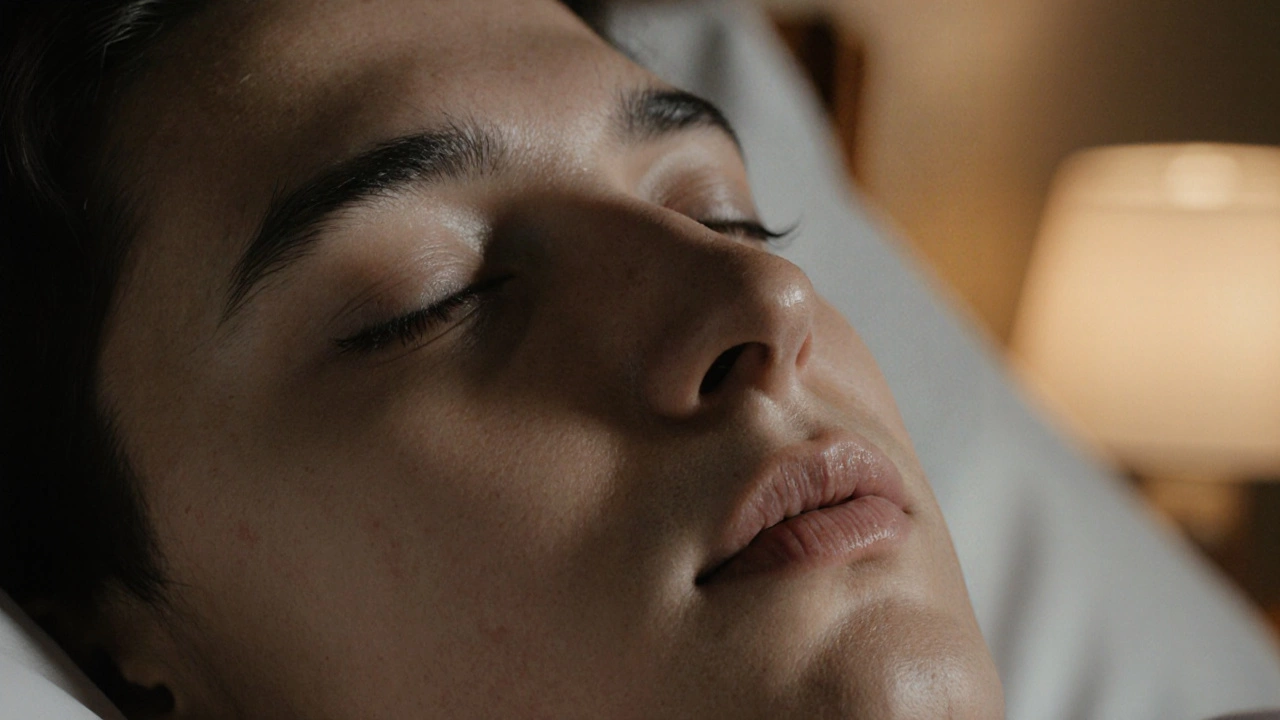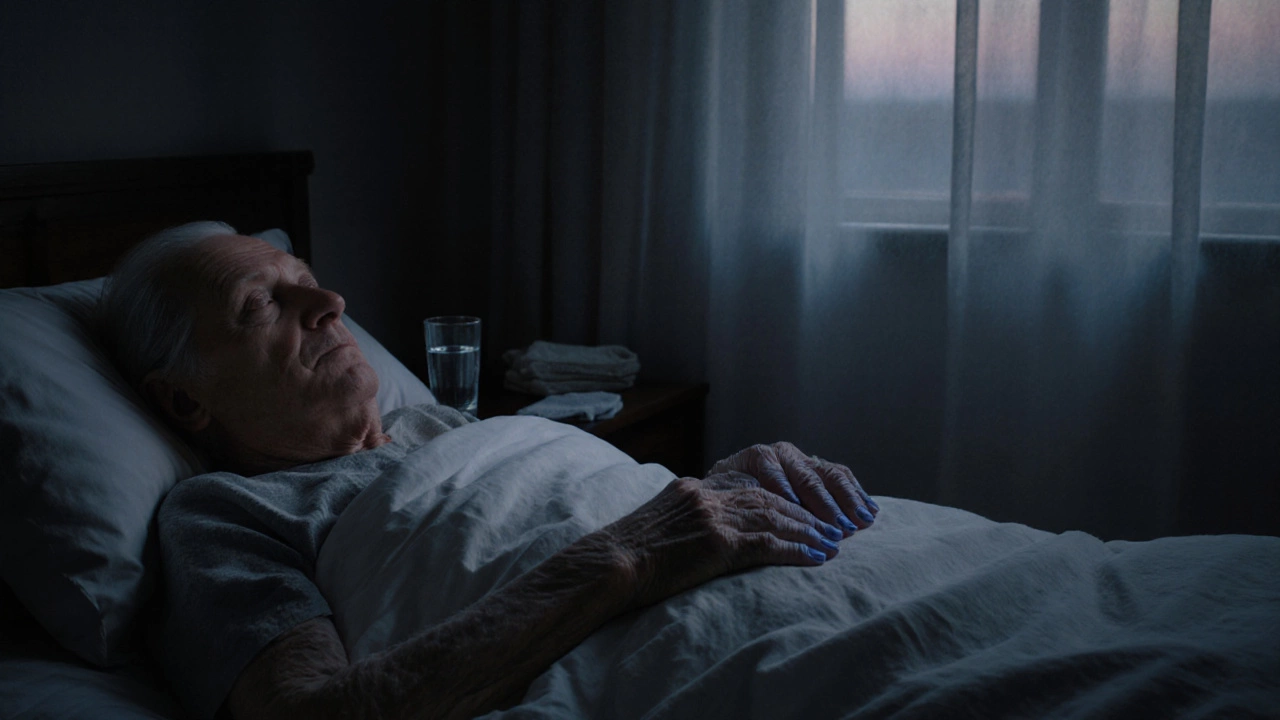End-of-Life Signs Checklist
This tool helps you recognize common physical signs as the body transitions during advanced cancer. These signs are part of a natural process—not a crisis. Your presence and comfort matter most.
Remember: Each person's experience is unique. Signs may appear in different orders or at different times. This tool is for information only—not medical advice.
Signs to Track
Your Observations
When cancer has spread widely and treatments no longer work, the body begins to slow down. This isn’t sudden. It’s a quiet, natural process-like a battery running out. People often fear the moment of death, but the real journey begins weeks or even months before, with small, subtle changes that signal the body is no longer fighting. These aren’t signs of failure. They’re signs of transition.
Your appetite disappears
One of the earliest and most common signs is losing interest in food. You might not feel hungry, even when you haven’t eaten in hours. Meals that once tasted good now feel heavy or even repulsive. This isn’t just about nausea from treatment. It’s the body redirecting energy. Digestion uses a lot of calories. When the body is focused on staying alive, it shuts down non-essential functions. Drinking water might still feel okay, but solid food becomes too much. This isn’t something you can force. Trying to eat when your body says no only leads to discomfort, not strength.
You sleep more-and wake up less
Sleeping 18 to 20 hours a day becomes normal. You might sleep through meals, conversations, or even the sound of loved ones talking. When you do wake up, you’re tired again within minutes. This isn’t laziness. It’s your body conserving every bit of energy. The brain isn’t shutting off-it’s prioritizing. Basic functions like breathing and circulation get the resources. Talking, thinking, moving-they take too much. This deep, unshakable fatigue is different from regular tiredness. No amount of coffee, rest, or encouragement will change it.
Your limbs feel cold and look bluish
Hands and feet get cold, even in a warm room. Skin may turn pale, gray, or slightly blue, especially around the lips and fingertips. This happens because blood flow is pulled away from the skin and sent to the heart and brain. It’s the body’s last effort to protect vital organs. You won’t feel cold-you won’t even notice it. But others will see it. The skin might also feel cool to the touch, dry, or mottled. This is not a sign of infection or something wrong. It’s a sign the body is preparing to stop.

You stop talking, or your words become unclear
Conversations get shorter. You might nod instead of answering. Sometimes, words come out wrong, or you forget what you were saying. This isn’t confusion from dementia. It’s the brain slowing down. The energy needed to form sentences, find words, or follow a thought is no longer available. You might still recognize people. You might still feel love. But expressing it takes more effort than you have left. Silence doesn’t mean you’re not present. Often, you’re listening more than ever.
Your breathing changes
Breathing becomes irregular. You might have long pauses between breaths-10, 15, even 30 seconds. Then, a few quick, shallow breaths. This is called Cheyne-Stokes breathing. It’s not painful. It doesn’t mean you’re suffocating. Your body is adjusting to lower oxygen levels. You might also hear a gurgling sound, sometimes called the death rattle. That’s not choking. It’s fluid building up in the throat because the muscles that clear it are too weak to work. Medication can help reduce the noise, but it’s not a sign of distress. It’s just part of the process.
You stop urinating or have very little output
Your kidneys slow down. You might go hours without peeing-or not at all. This isn’t dehydration. You’re still drinking water, but your body no longer needs to process waste. The kidneys are shutting down because the body is conserving fluids for the heart and brain. If a catheter is in place, urine output will drop to almost nothing. This change often happens days before the end. It’s not uncomfortable. It’s just another signal: the body is closing down.

Your eyes change
Eyes may stay open longer, even when sleeping. Pupils can become fixed and unresponsive to light. The gaze might seem distant, unfocused, or fixed on something no one else sees. This isn’t hallucination. It’s the brain’s visual processing slowing down. You might still recognize a loved one’s face, even if you don’t say it. The eyes are often the last thing to go. Many people report seeing loved ones who have passed before them. These aren’t signs of delirium. They’re often described as peaceful, comforting, and real.
There’s no more pain-or the pain changes
For some, pain fades. The body stops sending pain signals because the nervous system is shutting down. For others, pain shifts-becoming duller, more diffuse, less sharp. That doesn’t mean you’re getting better. It means your body is no longer able to register or react to it the way it used to. Pain medication is still given, but the goal isn’t to eliminate it completely. It’s to keep you comfortable. If you’re not asking for pain relief, it doesn’t mean you’re fine. It means you’re too tired to ask.
You’re not ready to let go-but your body is
Many people think the end comes with a cry, a final word, or a dramatic moment. It rarely does. Most often, it’s quiet. You drift in and out of sleep. Your breathing slows. Your hands grow colder. Someone holds your hand. You don’t open your eyes. But you might squeeze back. That’s all it takes. The body doesn’t fight anymore. It doesn’t need to. It’s done its job. What’s left isn’t about survival. It’s about presence. And sometimes, that’s enough.
Is it normal for someone with cancer to stop eating weeks before they die?
Yes. Loss of appetite is one of the most common signs in the final weeks. The body no longer needs food for energy. Digestion uses more energy than it provides. Forcing food can cause bloating, nausea, or aspiration. Offering small sips of water or ice chips is fine, but meals are no longer necessary or helpful.
Does being sleepy all the time mean someone is close to death?
Increased sleepiness is a strong indicator that the body is entering its final phase. Sleeping 18+ hours a day, being hard to wake, and showing no interest in surroundings are typical signs. This isn’t the same as fatigue from treatment. It’s a natural part of the body shutting down systems one by one.
Can someone still hear you when they’re unresponsive?
Yes. Hearing is often the last sense to go. Even when someone appears unconscious, they may still recognize voices, feel touch, or sense emotion. Speaking gently, sharing memories, or holding their hand can be deeply comforting-even if there’s no response.
Why does breathing become irregular near the end?
As oxygen demand drops and the brain’s control over breathing weakens, breaths become irregular-long pauses followed by quick, shallow breaths. This is called Cheyne-Stokes breathing. It’s not painful or frightening for the person. It’s a natural sign the body is slowing down. Medication can reduce the sound of the death rattle, but it’s not a medical emergency.
Should I try to give my loved one more fluids if they’re not drinking?
No. Forcing fluids can cause discomfort, swelling, or fluid buildup in the lungs. The body naturally reduces its need for water as organs shut down. Offering small sips or moistening the lips with a damp cloth is enough. The goal is comfort, not hydration.
Do people feel pain when their body is shutting down?
Pain often decreases as the nervous system slows. If pain was present earlier, it’s managed with medication. The goal isn’t to eliminate all sensation-it’s to keep the person calm and free from distress. Unexplained restlessness or grimacing may signal uncontrolled pain and should be checked.
How long does the final stage of cancer usually last?
The final stage can last from a few days to several weeks. Some people decline quickly over 2-3 days. Others linger for 2-4 weeks. There’s no set timeline. Signs like reduced breathing, cold limbs, and lack of urination usually appear in the last 1-2 weeks. The exact timing depends on the cancer type, overall health, and whether they’re receiving supportive care.
If you’re watching someone go through this, know that your presence matters more than your words. Sitting quietly, holding a hand, playing a familiar song-these are the things that stay with people. There’s no need to fix it, explain it, or rush it. Just be there. That’s what they need most.








